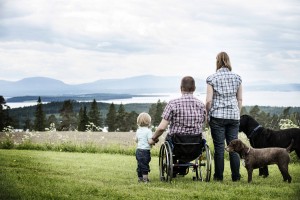Its now easier for people with disabilities to travel around Sweden's prime tourism region within nature-based experiences – Jämtland Härjedalen.

A large proportion of the population postponed their travel plans, because they do not know how accessible the preferred destination may be. Information regarding this is often incomplete, hard to find, or just purely lacking. For the convenience of those who are disabled, Jämtland Härjedalen Tourism (JHT) has started a project that focuses on improving both the information and the conditions for people with disabilities within the tourism industry in Jämtland and Härjedalen.
Not daring to travel because you don’t know if you can access the hotel, how to go to the bathroom, the possibility to make your way to sights or if there are any activities to participate in, is a reality for a large part of the population.
Finding information relating to accessibility is often difficult or next to impossible, which means that many disabled travellers are prevented from traveling to new places, experience new activities or visit popular attractions. JHT, during last winter, undertook a project to improve both the information and the facilities for people with disabilities within the tourism industry in Jämtland Härjedalen.
With minimal effort and resources, significant improvements can be brought about to improve accessibility and make our products, for example fishing and skiing areas, possible for people with disabilities to experience, says Håkan Munksten of JHT.
Håkan, who is wheelchair-bound himself, has seen the shortcomings first hand pertaining to the information available, but also sees the vast opportunities in correcting the shortcomings. During winter and spring, Håkan visited numerous tourism destinations and attractions around Jämtland & Härjedalen, offering suggestions and tips on how these destinations can improve information about the accessibility of their facilities and also on improving generally for visitors with special needs.
As a result, the feedback from operators has been very positive.
Most operators understand how important it is to work with these issues. It's about hospitality, about being able to accommodate all types of visitors and give everyone the same opportunity to share the experiences on offer. Many also recognize the economic benefits in order not to exclude up to 20% of the population that have accompanying families or aids, explains Håkan.
During the past winter, businesses in Åre destination were at the forefront with this project and ski resorts of Åre and Bydalen drew up a portfolio of their broad accessibility. This summer sees the project continue with Åre’s summer activities and businesses around Östersund and Storsjön expanding their profile. JHT has also committed to work with Funäsfjällen on their research pertaining to the accessibility portfolio throughout their destination.
Our hope is that by next winter and the following summer, critical information dealing with accessibility would be easy to find for both access to sights and to the various tourism businesses in our region. As a result, the work is most likely to open up in a wider range of activities that would be adapted for visitors with special needs, says Ingrid Hedlund, Project manager for JHT.
